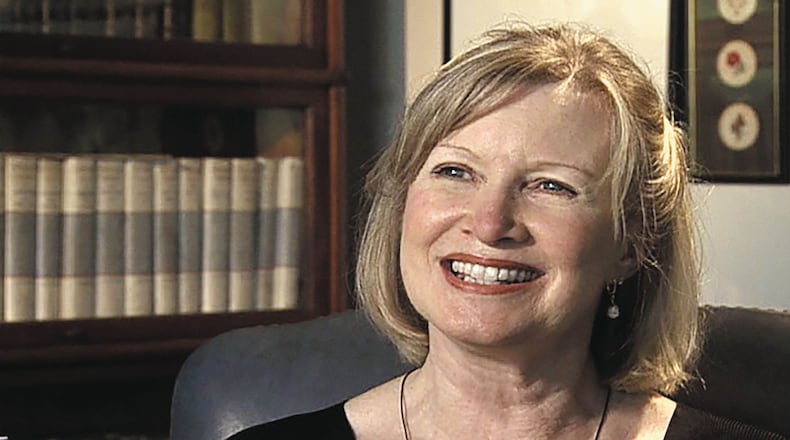Cassandra King arrived hungry to a cocktail party and indelicately crammed some food into her mouth. When she saw Pat Conroy standing before her for the first time, she “choked, swallowed, and coughed before blurting out, ‘Oh, God Almighty!’” That unpretentious beginning in 1995, when both parties were in middle age, launched a sweeping tale of love and literature recounted with heartfelt grace in this memoir.
King, modest as a church mouse, believed she would never see the famous author again, but he got ahold of her upcoming debut novel and wrote an enthusiastic blurb for it — a coveted imprimatur and a classic way for one writer to woo another. Settle in for a long, tentative, old-fashioned courtship. Conroy called her every now and then to talk shop, always keeping things light. She was as reserved as he was exuberant, never revealing much about herself. She was so circumspect, in fact, that he nicknamed her “Helen Keller.”
King had a few secrets. At the time, she was separated from her husband, a preacher. Their marriage had turned stormy, and their split was acrimonious. (Her tires got slashed.) She was eking out a living teaching writing and composition in small-town Alabama, and she had grown to value her solitude and privacy after the “goldfish bowl” life of a minister’s wife. Conroy kept inviting her to literary conferences, and she was too embarrassed to tell him she could not afford the admittance fee; she was also too polite to crash the mile-long lines at his book signings. So it was two years before they saw each other again.
Conroy as suitor is as incandescently charismatic as Conroy the stylist. What appears to be King’s coyness suited him just fine. Groomed in chivalry at The Citadel, he knew better than to push. Their conversations grew more intense and revealing, though, especially when the topic turned to depression.
On their first few dates, King, wary of his reputation for romantic tumult and self-destruction, kept him at arm’s length.
“I led a blissfully quiet life, bound to be dull compared to his in the fast lane,” she writes. “How could I possibly know that after one lovely but platonic dinner date, Mr. Conroy was about to come storming into my placid life with the force of a category 5 hurricane, and that nothing afterward would ever be the same?”
The long-deferred consummation, rendered without any graphic details, brings a sense of relief. Now we can get on with the rest of the story: 18 years of loving, reading and writing together, until his death from pancreatic cancer in 2016.
King hails from a modest background in Lower Alabama, but her family proves just as colorful and page-worthy as Conroy’s. And, it turns out, she is no prude; she just has a hard-earned sense of consequences. In her youth, she was a cocktail waitress who became a single mother before her ill-fated marriage to the pastor. Conroy, ever the champion of cathartic autobiography, encourages her to write about all of her experiences, particularly her first marriage, which she resists at first. The end result, though, is arguably the best of her other six books: “The Sunday Wife.”
With her marriage, she entered a new phase of fruitful creativity. Until she met Conroy and moved in with him on Fripp Island, South Carolina, King had never enjoyed a room of her own for writing. He would make that a priority wherever they alighted, and thoughtfully decorate it with her favorite prints.
He enlarged her world in other ways as well. Conroy was a foodie and had a James Beard Award to prove it. He cooked lavish meals for her, especially the Italian recipes he learned while living in Rome. King had never traveled much, so he took her around the world and introduced her, with pride, to famous people. Perhaps most important, he taught her to love the Lowcountry, where she still lives today, and this memoir abounds with lush descriptions of nature.
Conroy’s friends all reached the consensus that he finally had shown good judgment after two failed marriages and a string of doomed loved affairs with neurasthenic women — many of them “Yankees.” Everyone, including author Anne Rivers Siddons, commented on his newfound serenity and sobriety. Conroy’s brand was family dysfunction, after all, and King lent novel sanity to his routine. She never crows about herself, but she does not have to — her salt-of-the-earth decency and dignity shine like mica in a creek-bed. She was just the down-home curative his tormented soul needed. “I need someone to rescue me for a change,” he tells her.
The ending is every bit the tear-jerker you see coming. Conroy’s cancer moves rapidly. In a picturesque metaphor that he could have written, a mysterious night nurse sings hymns at his death bed and tells the family that a “bridge” will open up from heaven to guide Conroy home. Sure enough:
“For a brief moment of gold, the sun appeared through an opening in a cloud, then a beam of light began to form a bridge directly over the creek, one that led up to our dock. Those of us in the sickroom froze in place and watched in awestruck silence … A few minutes before Pat died, a bridge appeared over his beloved creek as if to offer him a passage from this world to the next.”
FICTION
‘Tell Me A Story: My Life with Pat Conroy’
By Cassandra King Conroy
William Morrow
400 pages, $24.99
About the Author
Keep Reading
The Latest
Featured


